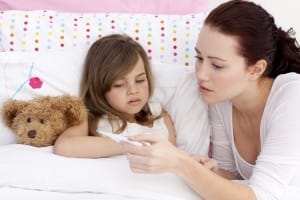Caring for children with pneumonia
Pneumonia Prevention and How to Care for Your Child
Categories:
 During the winter, the flu isn’t the only illness we’re at risk for—pneumonia is a culprit too. In fact, we’ve seen the topic of pneumonia in the media lately because former First Lady Barbara Bush was hospitalized for the illness, according to the New York Times. Pneumonia is more serious than a regular cold, which is what inspired my RN Remedies blog post, Signs, Symptoms and Treatment of Pneumonia and this post. Continue reading for prevention tips and how to care for your child if they become ill with pneumonia.
During the winter, the flu isn’t the only illness we’re at risk for—pneumonia is a culprit too. In fact, we’ve seen the topic of pneumonia in the media lately because former First Lady Barbara Bush was hospitalized for the illness, according to the New York Times. Pneumonia is more serious than a regular cold, which is what inspired my RN Remedies blog post, Signs, Symptoms and Treatment of Pneumonia and this post. Continue reading for prevention tips and how to care for your child if they become ill with pneumonia.Pneumonia Prevention Tips

- Keep your child away from children (and adults) who are sick. If you child is sick with upper or lower respiratory tract symptoms (e.g. runny nose, cough and sneezing), it is best to keep them away from healthy children.
- Make sure your child is vaccinated. The Hib and Pneumococcal vaccines (PVC13) will help protect your child against bacterial pneumonias.
- Make sure your child gets a flu shot. Did you know the influenza (flu) virus could turn into pneumonia?
- Frequent hand washing with warm water and soap is very important to prevent viruses or bacteria from entering the body when hands come in contact with your child’s nose or mouth. When you’re on the go, use hand sanitizer.
- Don’t let your child share eating utensils, cups or straws with others. Same goes for facial tissue and handkerchiefs.
Caring for a Child Battling Pneumonia
If you think your child has pneumonia, schedule an appointment with their pediatrician promptly. In most cases, pneumonia can be treated at home after your child sees their doctor, but in more serious cases children require hospitalization.
Tips for caring for your child at home:
- If your child’s pediatrician prescribes antibiotics, give them to your child at the correct time each day and for the entire duration prescribed. Don’t stop the antibiotic after a few days even if your child is feeling better. Address any concerns about the medication or side effects with the pediatrician.
- Check with your child’s pediatrician before giving over the counter cough and cold medications (Many of these are NOT recommended for children under six years of age).
- Check your child’s temperature with a thermometer. Anything greater than 100.4 F is considered a fever. Do not attempt to guess if your child has a fever by simply feeling if their body seems hot.
- Keep your child well hydrated. This is a golden rule for almost any type of illness to prevent dehydration.
- Allow your child to get plenty of rest—naps, quiet play and lounging on the couch work the best.
- A humidifier helps moisten the air and may help your child breathe better.
- If you notice your child is having difficulty breathing (rapid chest rise, tummy moving in and out fast, sucking in at or under the ribs with breathing or nasal flaring), take them immediately to the emergency room for evaluation.
- Your child’s lips and nail beds should be rosy pink, not blue or gray, which is a sign your child may not be getting enough oxygen. If this happens, your child needs to be seen by a doctor immediately.
- If your child is treated at home for pneumonia and is not getting better or looks worse, take them back to the doctor for evaluation. They may require hospitalization.
I hope this information is helpful. Remember, pneumonia prevention is key and that involves your family staying healthy. Remind your child to wash their hands frequently and practice good hygiene, keep them away from those that are sick, feed them healthy and nutritious food and make sure they get vaccinated. I always think that parent instincts are spot-on, so if you are worried that your child may have pneumonia, make sure they are evaluated promptly by the pediatrician.
Caring for children with pneumonia
![Caring for children with pneumonia]() Reviewed by PatPew
on
tháng 12 09, 2018
Rating: 5
Reviewed by PatPew
on
tháng 12 09, 2018
Rating: 5

Không có nhận xét nào: